

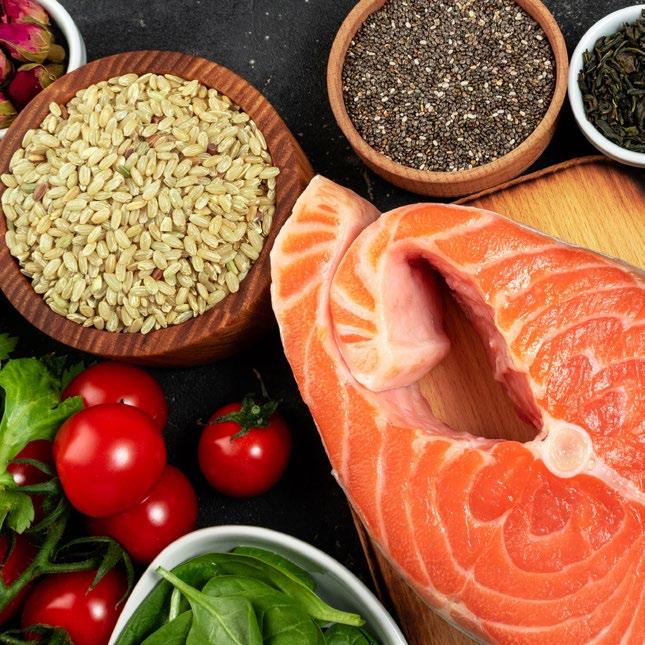

/ AgEnvSc
BSc / AgEnvSc
BSc / AgEnvSc





/ AgEnvSc
BSc / AgEnvSc
BSc / AgEnvSc
McGill University is on land which has long served as a site of meeting and exchange amongst Indigenous peoples, including the Haudenosaunee and Anishinabeg nations. We acknowledge and thank the diverse Indigenous peoples whose presence marks this territory on which peoples of the world now gather.
BSc Agricultural and Environmental Sciences
ma Agricultural Economics
sp Agribusiness
sp Environmental Economics
sp Professional Agrology
ma Agro-Environmental Sciences
sp Animal Production
sp Ecological Agriculture
sp Plant Production
sp Professional Agrology
ma Environment
ma MAJOR: Primary area of study
co CONCENTRATION: Specific area of study within a major
sp SPECIALIZATION: Specific area of study within a major
op OPTION: Specific area of study within a major
co Biodiversity and Conservation
co Ecological Determinants of Health
co Environmetrics
co Food Production and Environment
co Land Surface Processes and Environmental Change
co Renewable Resource Management
co Water Environments and Ecosystems
ma Environmental Biology
sp Applied Ecology
sp Plant Biology
sp Wildlife Biology
ma Global Food Security
sp International Agriculture
ma Life Sciences
sp Animal Biology
sp Animal Health and Disease
sp Life Sciences (Multidisciplinary)
sp Microbiology and Molecular Biotechnology
sp Plant Biology
BEng Bioresource Engineering
op op op
Bio-Environmental Engineering
Bio-Process Engineering
Bio-Production Engineering
op Professional Agrology
BSc Food Science
op Food Chemistry
op Food Science
BSc Nutritional Sciences
ma Dietetics
ma Nutrition
co Food Function and Safety
co Global Nutrition
co Metabolism, Health, and Disease
co Sports Nutrition
BSc Food Science and BSc Nutritional Sciences (Concurrent degree)
For application details, please visit: mcgill.ca/applying
McGill University is one of the world’s top universities we attract leading professors and talented students from over 150 countries. Macdonald Campus is on the western tip of the city, in the scenic suburban town of Ste-Anne-de-Bellevue, a short commute away from McGill’s Downtown Campus in Montreal.



Macdonald Campus (also known to students as “Mac”) is the largest green space in Montreal, with over 650 hectares of fields, forest, and riverfront to explore. Home to the Faculty of Agricultural and Environmental Sciences, it is the perfect place to take advantage of hands-on learning opportunities. Join the challenge to ensure humanity’s needs for food and health are met while protecting the environment.
Research opportunities //
McGill’s researchers are advancing the fields of biological, food, nutritional, and environmental sciences. Our research often cuts across disciplines to solve challenges in health, agriculture, and biotechnology.
The best of both worlds //
Our students love Mac’s “small campus” feel and sense of community. They also love taking a quick trip downtown for Montreal’s festivals, culture, and nightlife. As a McGill student, you can explore courses, join clubs, and participate in events on both campuses.
Students from around the world choose to study at McGill’s Macdonald Campus, making us a vibrant international community. You’ll enjoy small class sizes, in which you can make friends and get to know your professors.
EXPLORE OUR CAMPUS

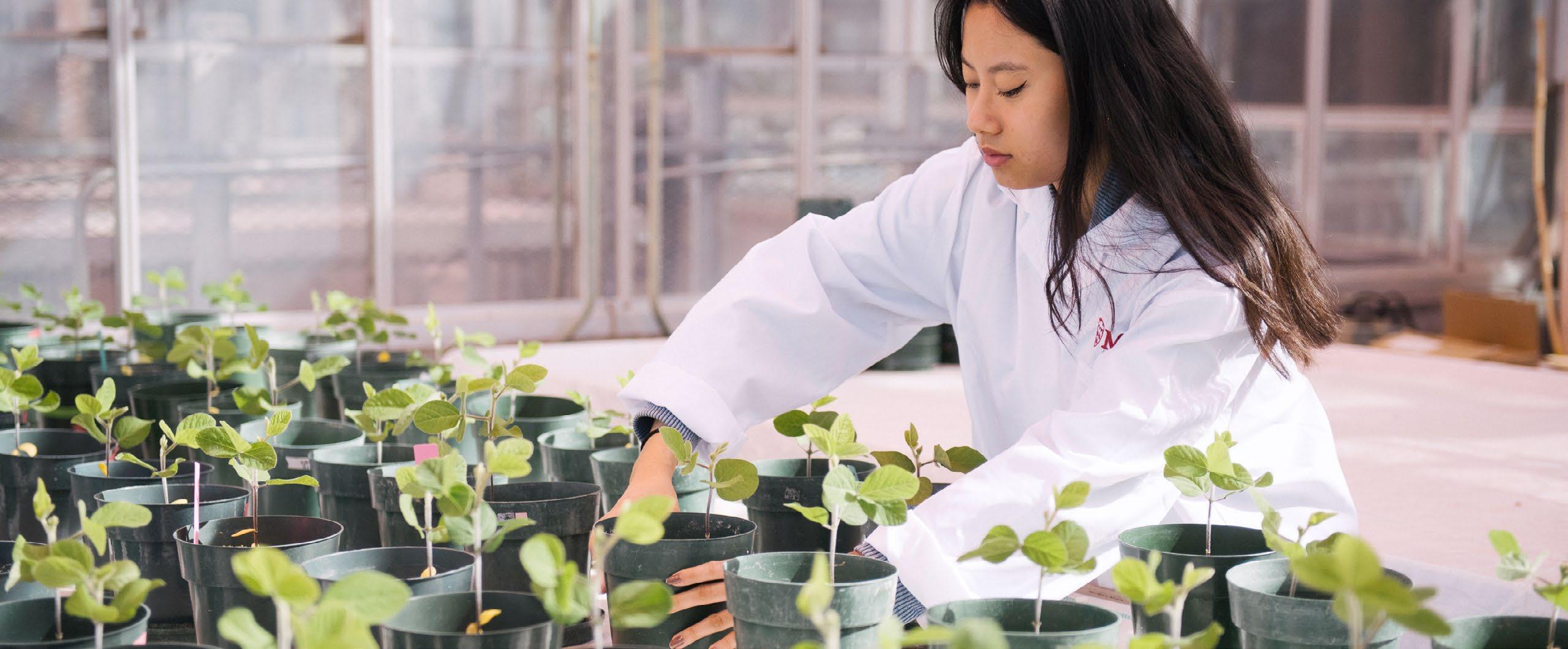
We’re big believers that the best way to learn is through hands-on experience. Your “classroom” could be anything from our greenhouses and culinary labs to the shores of Montreal’s St. Lawrence River and trails of Morgan Arboretum. There’s also a fully functional teaching and research farm. You’ll discuss the theory behind it all in lecture halls and active learning classrooms.
//

McGill has research institutes in communities around the world. You can apply the knowledge you learn in class during field semesters and courses in countries like Kenya, Tanzania, Barbados, Guatemala, and Panama.
//
You can go on an exchange semester at one of 150 partner universities in 40+ countries. McGill offers bursaries to help you realize your global learning ambitions and experience another culture.
Earning a degree from a world-class institution will set you apart — and gaining work experience is important too! You can pursue internships, research projects, outreach, and volunteer opportunities. We offer funding and support so you can seize experiences that will pay off in your career. You’ll also have the chance to meet prospective employers at our annual career fair and explore other services offered.
Internships are a great way to build connections and gain experience related to your studies. We can help you find opportunities in leading research institutions, industry, and community organizations — local and international.
Some of the world’s greatest discoveries are happening right here. Even as an undergrad, you’ll have the chance to conduct meaningful research alongside leading minds in your field. We offer funding to help bring your research to life.




Stay active and explore the outdoors //
Around campus, you can explore forested trails, kayak on the river, play volleyball, or work out at the indoor or outdoor gyms. We also have an arena and gyms where you can skate, swim, take fitness classes, and play intramural sports.
Get involved on campus //
No matter what your interests are, you can find a student association or club for it at McGill – chocolate factory tours with the Food Science Association, jam sessions with the Music Club, white-water rafting with the Outdoors Club. Here you’ll have the chance to develop your passions and discover new ones.
Find support when you need it //
McGill offers services to support your health, wellness, and success:
N Campus Life & Engagement
N Career Planning Service
N First Peoples’ House
N International Student Services
N Office of Religious & Spiritual Life
N Scholarships & Student Aid
N Student Accessibility & Achievement
N Student Wellness Hub


Living in residence is a great way to make friends from different cultures and backgrounds and make the most of your McGill experience. Whether you plan to stay here for your first year or your full degree, it’s a great way to get integrated in the community.
Our two residences are just a quick walk away from classes //
LAIRD HALL — The classic dormitory-style residence experience, with single or double rooms, shared bathrooms, kitchens, and common spaces. Open to all incoming students.
ECO RESIDENCE — Duplex (2 bedroom) or six-plex (6 bedroom) apartments with private single bedrooms. Open to returning and graduate students only.
EXPLORE RESIDENCES

CONTACT US
This major will help you understand the molecular and biochemical foundations of life that lead to genes, cells, and the organisms around us. Life sciences is a constantly evolving field, with new knowledge and applications in biotechnology, medicine, and forensics emerging each year.
Your classroom //
Many of your courses will involve work in fullyequipped science labs to provide you with hands-on experience. You’ll also have courses with outdoor labs in the unique natural setting of Macdonald Campus.


Your courses //
In this cross-disciplinary program, you’ll take core courses in fundamental biological sciences (animal, plant, microbiology, cell, and molecular) and courses in a specialization of your choice. You can also pursue a research-intensive Honours program in your final year.
//
In the Life Sciences major, you’ll need to choose at least one specialization. We recommend:
Animal Biology / Biology of large mammals and birds, including genetics and biotechnology
Animal Health and Disease / Animal physiology, function, and disease prevention and treatment
Life Sciences (Multidisciplinary) / A flexible, multidisciplinary approach to the study of pure and applied life sciences

Microbiology and Molecular Biotechnology / Pure and applied microbiology, molecular genetics, pathogenicity, environmental microbiology, genomics, biotechnology, and bioinformatics
Plant Biology / Molecular, biochemical, and cellular biology of plants
Some students may also choose to do the Wildlife Biology specialization.
Career paths //
Life sciences is a broad field that can lead to a variety of careers, including work in research and development or applied science. You can also pursue graduate studies or a secondary degree to work in veterinary science or medicine.
N Future studies in health sciences, including medicine
N Future studies in veterinary science
N Food and fermentation industries
N Bioscience and pharmaceutical industries
N Agricultural biotechnology
N Environmental sciences
N Forensic sciences
//
As you progress in your program, you can gain essential hands-on experience by completing a field project or internship. Our students have been:
N Investigating microbes in the Arctic
N Researching epigenetics in Grenoble, France
N Helping improve water and soil quality in Shanghai
N Interning at veterinary clinics in Quebec


This major offers world-class training in the biology, conservation, and ecology of plants, birds, mammals, fish, insects and microbes. By studying human impact on species and ecosystems, you can help solve important environmental challenges.
Your classroom //
Environmental Biology has a significant field component. You’ll take outdoor labs in the unique setting of Macdonald Campus and explore the complex biodiversity of our fields, forests, and lakeshore. On and off campus, you can join in cutting-edge research on climate change and its effects on animals and ecosystems.

Your courses //
This program provides a foundation in endangered species conservation, environmental pollution, and protected areas management. You’ll study how organisms adapt to changes in the environment and the consequences for ecosystems. You can also pursue a research-intensive Honours program in your final year.
In the Environmental Biology major, you’ll need to choose at least one specialization. We recommend:

Applied Ecology / Deepening the understanding of how ecosystems function
Plant Biology / Ecology; Molecular, biochemical, and cellular biology of plants
Wildlife Biology / Proper management and conservation of essential wildlife species and their habitats
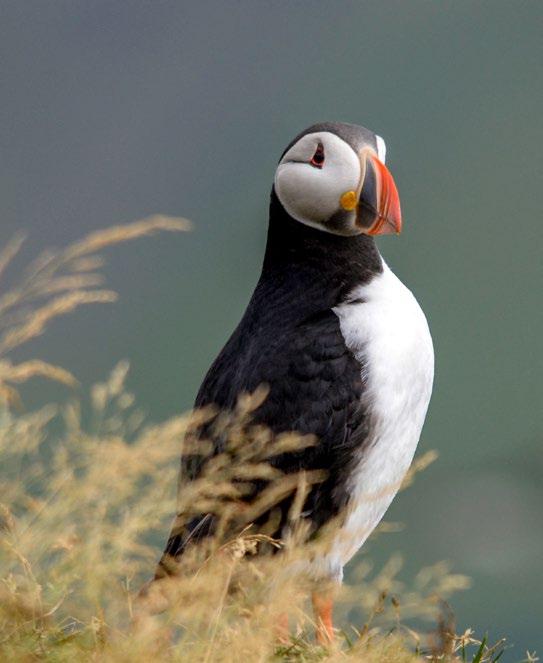
The experience and skills you acquire in this program will prepare you for a wide choice of careers in biological and environmental sciences. You could work in:
N Wildlife biology
N Conservation
N Zookeeping
N Public or private lands management
N Environmental impact assessment
N Nature documentary filmmaking
As you progress in your program, you can gain essential hands-on experience by completing a field project or internship. Our students have been:
N Assessing environmental changes in Paraguay
N Interning at wildlife rehabilitation centers in Canada and the US
N Ensuring the protection of sea turtles in Greece
N Studying medicinal plants in Peru
N Working with Indigenous groups to measure the health of polar bears
N Studying puffins in Alaska and the St. Lawrence River

This major provides training in the science, biology, and management of cultivated crops and domestic livestock. In this interdisciplinary and solution-oriented field you’ll learn how to produce food while protecting the environment.

Your classroom //
You’ll gain real-world experience in agricultural production in the crop fields, orchards, greenhouses, and dairy and poultry facilities on campus. This program has a strong hands-on lab component and involves visits to agribusinesses.
Your courses //
In this program you’ll explore the basic and applied biology of cultivated crops, domestic animals, arable soils, and the economics of agriculture. You’ll also choose one or two specializations in connected disciplines and, in your final year, can pursue a research-intensive Honours program.

In the Agro-Environmental Sciences major, you’ll need to choose at least one specialization. We recommend:
Animal Production / Animal nutrition and reproduction, maintaining respect for the environment and the welfare of animals
Ecological Agriculture / Highlights the relationship among soils, plants, animals, and humans
Plant Production / Biology, physiology, breeding, propagation, and management of domestic plants
Professional Agrology / Through internships, projects and courses, develop an understanding of the social, legal and regulatory context in which Quebec agriculture is practiced

Students who wish to become members of the Ordre des agronomes du Québec (OAQ) [Order of Agrologists of Quebec] must complete both the Professional Agrology specialization and one of the other suggested specializations.
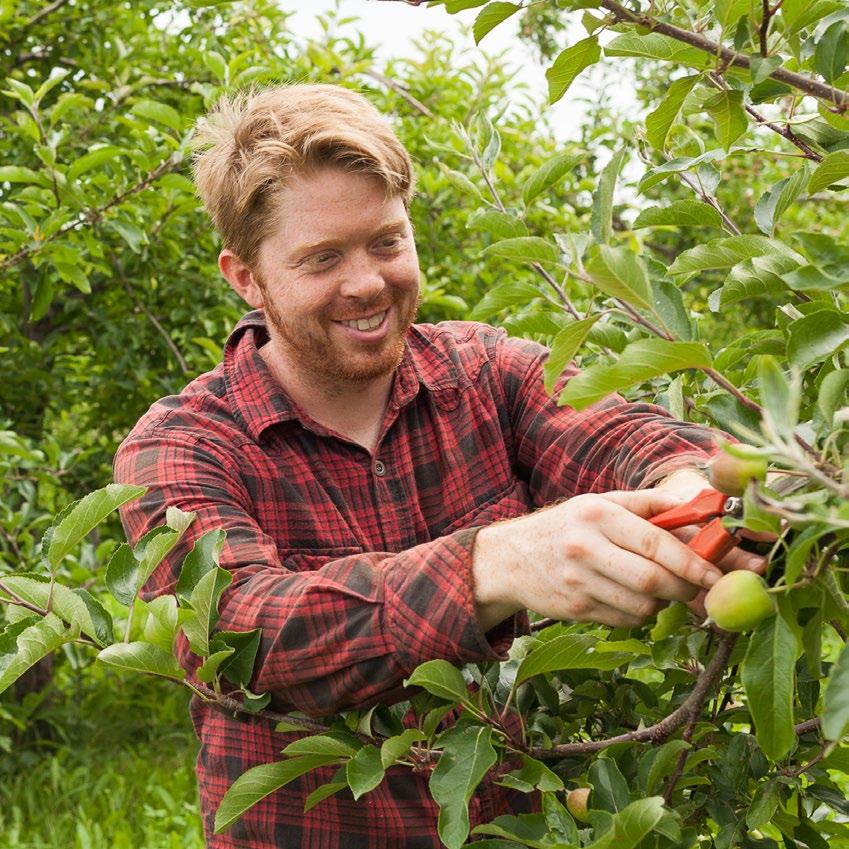
This program leads to a wide variety of careers in all sectors of agriculture, including agronomy if taken with the Professional Agrology Specialization. You could work in:
N Crop consulting
N Livestock nutrition
N Food system design and improvement
N Farm business management
N International development consulting
You’ll have plenty of opportunities to learn off campus in this program through field studies and internships.
Our students have been:
N Interning at local dairy and vegetable farms
N Analyzing insect populations in India
N Giving conferences to youth and women in rural Senegal
N Testing new optical technology to assess the quality of beef carcasses
N Optimizing the performance of autonomous weed removal robots
N Documenting the welfare of dairy calves on Quebec farms
N Improving fungal disease management on Quebec golf courses


This major provides a global perspective on agriculture and food security. By learning about rural development, poverty, and food safety, you can work with communities to improve lives, locally and around the world.
Your classroom //
This program involves coursework, hands-on labs, and practical field experience. You can also gain real-world experience in a local community or a developing country.
Your courses //
This multidisciplinary program explores food security from a variety of angles. You’ll learn about issues in nutrition, agriculture, international development, resource management, and environmental sciences. You can also pursue a researchintensive Honours program in your final year.
In the Global Food Security major, you’ll need to choose at least one specialization. We recommend:
International Agriculture / Understanding of agriculture as a central mechanism to help rural development, alleviate poverty, and achieve food security, especially in the developing world
The knowledge and skills you gain in both the natural and social sciences will set you apart when entering the job market. This program will prepare you to work for governments and non-governmental organizations, as well as in the public and private sectors. You could work in:
N Agribusiness management
N International research and project management
N Policy analysis
N Research
As you progress in your program, you can gain essential hands-on experience by completing a field project or internship. Our students have been gaining handson experience in developing countries by meeting and working with locals to develop projects in their communities.

This major will show you how to use economic and management principles to understand and optimize the way we produce and distribute food. You’ll gain a foundation in agriculture and international development, food systems, trade and natural resource management, and policy.
Your classroom //
Your courses will be taken at the Macdonald Campus and on the Downtown Campus, in the Desautels Faculty of Management. Some of your classes may also have fieldwork or lab components.
Your courses //
In this flexible, interdisciplinary program, you’ll take courses in economics, marketing, finance, resource economics, and public policy. You can also explore environmental issues or agriculture in more depth depending on your chosen specialization.
In the Agricultural Economics program, you will need to choose at least one specialization:
Agribusiness / Understanding agriculture and food systems, including financial and market
analysis and the appropriate policies for agriculture and food systems
Environmental Economics / Economics, environmental policies, and the management of natural resources integrated with biological and environmental sciences
Professional Agrology / Agrology encompasses the science and technology required for agricultural production
To become a member of the Ordre des agronomes du Québec (OAQ) [Order of Agrologists of Quebec], you will need to take both the Agribusiness and Professional Agrology specializations.



This program will prepare you for careers in many sectors, including government and non-profit organizations, international development, and the multibillion-dollar agri-food industry. You could work in:
N Agribusiness, farming, or natural resources management
N Environmental economy
N Environmental and agricultural policy analysis
N Banking, finance, marketing (agri-food industry)

N Professional agrology
You could also pursue graduate studies in areas like agricultural economics, environmental management, and law, among others.
You can choose to complete an internship either on a farm or at an agri-food or environmental-related business as one of your complementary courses. Our students have been:
N Optimizing software used by Quebec dairy producers to manage their business
N Documenting grain trading activities among businesses undergoing a merger
N Evaluating agricultural producers’ funding requests to financial institutions
N Exploring alternative means of pricing pork meat in Quebec
The Major in Environment brings together a broad range of perspectives, ideas, and expertise to tackle some of the most pressing challenges facing our world. This major will prepare you to address complex and uncertain problems through systems thinking, and to propel change and inform policy through effective communication.
Your classroom //
Most of your lectures and labs will take place on the Macdonald Campus. You can also explore courses and other opportunities on the Downtown Campus. Many Environment students pursue field courses and research activities locally and around the world, including field study semesters in Panama, Barbados, and Africa.
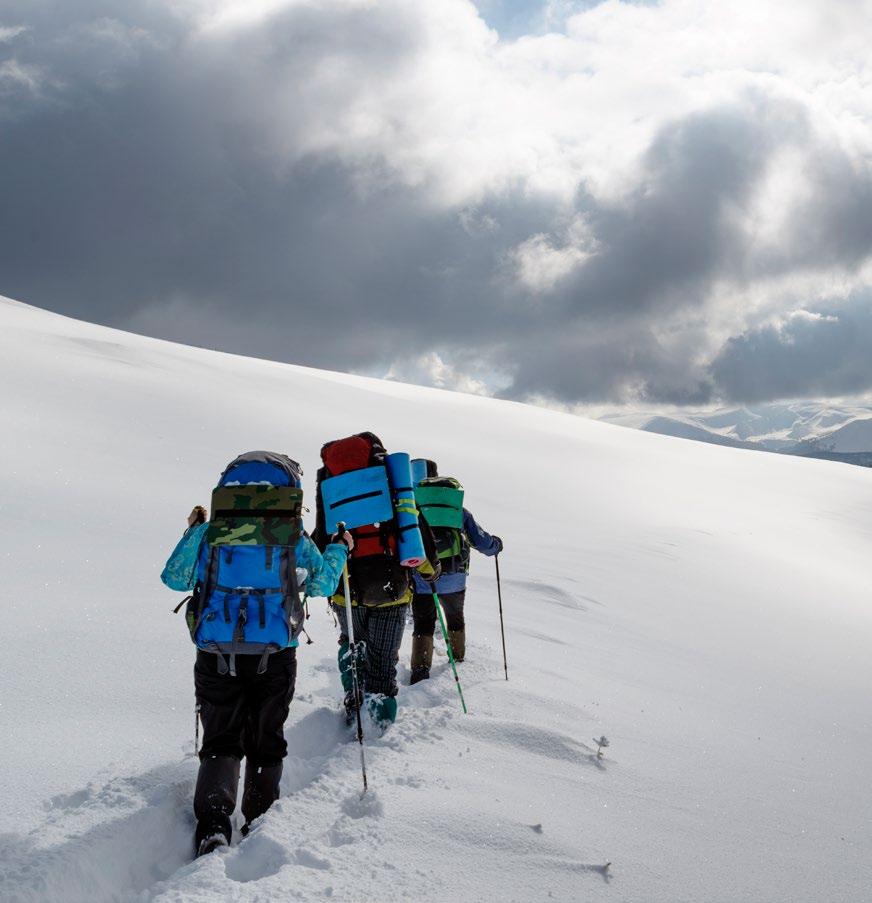
courses //
This interdisciplinary program will introduce you to different approaches to viewing and understanding our social and natural ecosystems in all their complexity. At the core of your program will be courses on global change, sustainability science, environmental ethics, and environmental research design. Some of your courses will also include group research projects.
In this major, you’ll choose a concentration. You could focus on:
N Biodiversity and Conservation
N Ecological Determinants of Health
N Environmetrics
N Food Production and Environment
N Land Surface Processes and Environmental Change
N Renewable Resource Management
N Water Environments and Ecosystems
This program provides broad training which can lead to a variety of careers. You’ll be prepared to tackle pressing environmental issues from many angles. Some examples:
N Community outreach and conservation
N Environmental assessment
N Managing sustainable development or environmental programs
N Public health
N Environmental sciences
N Environmental policy advising and development
N Advising in corporate, social, and environmental responsibility
N Biostatistics
N Climate change analysis
N Environmental communication and education
N Environmental / green innovation and entrepreneurship
As you progress in your program, you can gain valuable hands-on experience by completing a field course or internship. You can also gain research experience with a professor over the summer, through independent study, and through the Honours program.
Our students have been:
N Interning on agroforestry projects in Ecuador
N Working with Parks Canada and the City of Montreal
N Assisting with research on a Quebec beaver census
N Educating the public as local Environment Awareness Agents


As the world’s population grows, so does our need for food, renewable energy, and biomaterials. In this program, you’ll learn how to connect natural sciences and engineering design to optimize our use of bioresources while protecting the environment.
Your classroom //
Your courses will include lectures, problem-solving sessions, hands-on labs, and other experiential learning activities. In some courses, you’ll visit relevant industrial sites. Most of your courses will be offered at the Macdonald Campus, but at least one semester of courses will be taken on the Downtown Campus.
Your courses //
You’ll follow a core set of engineering courses, as well as complementary engineering, natural science, and social sciences classes, which you can choose based on your interests.

In the Bioresource Engineering program, you can choose to follow one of three streams:
Bio-Environmental Engineering / Focus on knowledge of soil and water engineering, ecological engineering, organic waste management, and related topics essential for humanity’s sustainable development, resilience to climate change, and other contemporary challenges.
Bio-Process Engineering / Apply engineering skills to design nature-inspired infrastructure for transforming agricultural and other natural resources into products such as food, fiber, biofuel, biomaterials, and sustainable composites.
Bio-Production Engineering / Complementing the legacy of the agricultural engineering profession, this stream explores new realities of smart farming, controlled production systems, and emerging bio-production processes.
A Professional Agrology Option is available for students interested in obtaining agrology licensing through the Ordre des Agronomes du Québec (OAQ) [Order of Agrologists of Quebec]. Students can also enroll in an Honours program and pursue several minors.

Bioresource Engineering is a professional engineering program accredited by Engineers Canada. Graduates can obtain professional engineering (PEng) licensing in all Canadian provinces, including with the Ordre des ingénieurs du Québec [Order of Engineers of Quebec]. As a licensed PEng, you can pursue a career in many areas, including:
N Biofuel and Bioenergy Engineering
N Ecological and Environmental Engineering
N Food Process Engineering
N Machinery Design
N Organic Waste Management Engineering
N Post-Harvest Technologies
N Water Resource Management Engineering
Following your study plan, you can gain essential hands-on experience through undergraduate research and internships, as well as clubs. Our students have been:
N Working for the United Nations Food Program
N Interning on urban rooftop farms in Washington, DC
N Joining Engineers Without Borders projects in rural Africa
N Developing new soil moisture sensors and bee smokers
N Integrating food production systems with the Canadian Space Agency
N Designing plant production systems for Controlled Environment Agriculture
N Conducting laboratory research work with US-based universities
N Working on quarter-scale tractor and agricultural robotics design projects
N Working with professional societies like the Canadian Society for Bioengineering and American Society of Agricultural and Biological Engineering

FSc
Food scientists are working to meet the global demand for safe, nutritious, and sustainable foods. In this multidisciplinary field, you’ll learn how concepts of chemistry, physics, biology, and engineering can be applied to better understand food processes and improve food products.
Your classroom //
Your courses will include lectures and hands-on learning in specialized food science labs. You’ll use high-performance equipment to test and develop new products. You’ll also conduct focus groups and taste panels in unique facilities.
Your courses //
Food Science is a multidisciplinary program accredited by the Institute of Food Technologists (IFT), which includes courses in chemistry, microbiology, physics, sensory analysis, and engineering. You’ll study topics like food processing and packaging, quality assurance, and flavour chemistry.
Program options //
In the Food Science major, you can choose one of two program options:
Food Chemistry / Includes two additional research projects and qualifies students for the Ordre des chimistes du Québec (OCQ) [Order of Chemists of Quebec]
Food Science /
Integrates courses from many disciplines related to the science of food, including biochemistry, microbiology, and processing

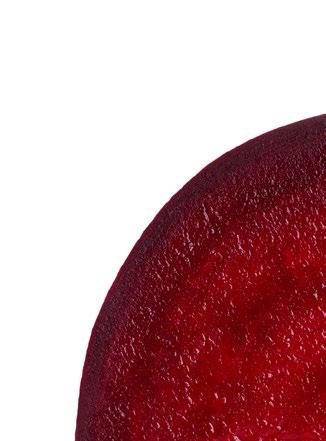

This multidisciplinary program will prepare you for an exciting career path in agri-food, pharmaceutical, and related industries. You could work in areas like:
N Food and flavour industries
N Food safety and quality
N Technical sales and marketing
N Research (university, government, private sector)
N Food biotechnology
N Environmental sciences
N Forensic sciences
As you progress in your program, you can gain essential hands-on experience by completing an internship or research project. Our students have been:
N Creating award-winning new foods
N Learning quality control in a Malaysian beverage factory
N Designing healthy meals in a Parisian bakery
N Interning at large food plants in Canada

NutrSc

In this research-based major you’ll explore how diet and nutrition impact human health and disease. By understanding the link between nutrients, health, environment, and society, you can improve lives in local and international communities.
Your classroom //
Your courses will involve lectures and hands-on training with high-performance equipment in specialized nutritional science labs.
Your courses //
This major covers the scientific fundamentals of nutrition and metabolism throughout the lifespan. You’ll take courses in biochemistry, physiology, advanced nutrition, statistics, genetics, and food chemistry. In your second year, you can apply to an Honours program and study the design, execution, interpretation, and reporting of research in human nutrition.

In the Nutrition major, you’ll need to choose one specialization:
Food Function and Safety / Health effects of phytochemicals and food toxicants, food chemistry and analysis, food safety, product development, and influence of constituents of food on health
Global Nutrition / Interactions between nutrition, diet, water, environment, and infection
Metabolism, Health, and Disease / Influence of diet and nutrition on human health and the pathophysiology of inherited and acquired chronic disease
Sports Nutrition / Influence of exercise and physical activity on health and chronic disease prevention

This major will equip you to work in several health and scientific fields, and prepares you for graduate or professional studies such as medicine, dentistry, optometry, or veterinary school. You could work in:
N International nutrition and health promotion
N Pharmaceutical industries (sales, product development and testing, education, marketing, industrial associations)
N Food product research and development
N Food labeling and food inspection
N Government and non-governmental organizations (program administration and development, public policy, research)
N Science communication, technical writing and media
The Nutrition Major does not lead to professional licensure as a dietititian-nutritionist.
See Dietetics Major on page 26.
This is a flexible program that offers you the chance to participate in research and field studies, as well as internships. Our students have been:
N Working in university and hospital research labs
N Collaborating with McGill researchers in other departments, such as Kinesiology
N Doing nutritional marketing in New York City
N Interning in local community kitchens

After completing this professional program, you are eligible to become a registered dietitian-nutritionist. By studying the connection between food, nutrition, and health, you can help individuals and communities make healthier choices, and improve lives.
Your classroom //
Many of your courses will include lectures and hands-on learning in our specialized food and nutrition labs. In the lab, you’ll have access to high-performance equipment to test food products and explore the science of foods.
Your courses //
You’ll cover subjects like nutrition and health, metabolism and human nutrition, food fundamentals, clinical nutrition, and more.

This program is recognized by the Ordre des diététistes-nutritionnistes du Québec (ODNQ) [Order of dietitiansnutritionists of Quebec]. Upon being registered with a provincial regulatory body, you will be qualified to work as a dietitian, which opens the door to many career opportunities in food and nutrition. As a licensed health professional, you can work in settings like:
N Private practice
N Clinical nutrition in hospitals, medical clinics, community clinics, and long-term care centres
N Food provision management
N Nutrition and health promotion agencies
N Nutrition communication agencies and the media

Supervised internships (known as stages) are integrated into the program to help you gain essential hands-on experience. Your stages are organized by the school and will be completed over 40 weeks. All students complete their clinical nutrition stages at hospitals, clinics and/ or long-term care centers in Quebec, mostly in the Montreal region. You’ll gain experience in community nutrition or public health nutrition by working with various groups including children and members from disadvantaged communities.
Food provision management experiences are completed at hospitals, long term care facilities, or food banks.
You can complete additional stages (up to 6 weeks) in your final year in areas such as media, nutrition communications, sports nutrition, food industry, or private practice.
French proficiency is an admission requirement to allow students to complete the mandatory stages.
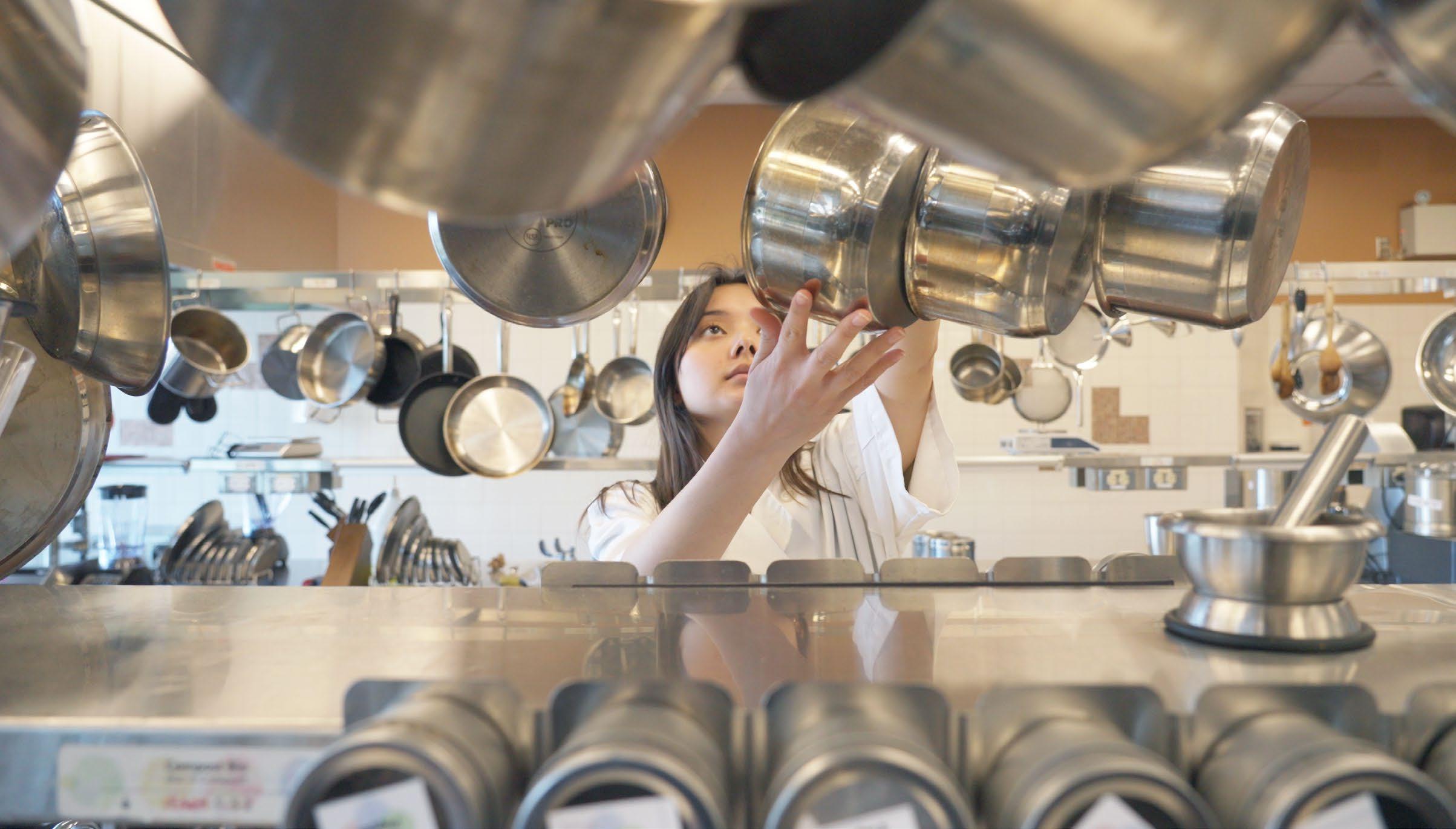

FSc+ NutrSc
In this unique program, you’ll study the complementary disciplines of food and nutritional sciences, earning two degrees. You’ll learn how to create better-tasting, longer-lasting food, and understand the role nutrition plays in health and disease.
Your classroom //

Your courses will include lectures and hands-on work in our specialized food and nutrition labs. You’ll develop and test new foods and products using high-performance equipment, and take your research deeper with taste panels and focus groups.
Your courses //
Your food science courses will explore the chemistry of food and the scientific principles of food preservation, processing, and packaging. You’ll work to discover new ingredients and explore how they can be incorporated in foods. In your nutrition courses, you’ll explore the nutritional aspects of food and metabolism, and the link between nutrition, health, and disease.

This degree leads to opportunities in many industries, including work in the private sector, government, and nongovernmental organizations. You can also pursue graduate studies and conduct advanced research in food science, nutrition, education, and public health. You could work in:
N Agri-food companies
N Food chemistry
N Food inspection
N Food labeling and packaging
N Food product research and development
N Nutraceutical industries
In this program, you’ll apply and further develop your skills in a professional working environment.
In a food industry internship, students carry out specific functions within a company, including new product development, quality assurance, sensory analysis, food analysis, and food processing.
In a nutrition industry internship, students can conduct clinical research alongside medical practitioners, work with international NGOs in developing countries, or work in other areas like food product development, nutritional labelling, and educational/promotional material.



What will it cost? //
The answer depends on where you’re from, what you choose to study, and where you want to live. Use our calculator to get a better sense of your costs.
Need financial help? //
Whether you’re a Canadian or international student, McGill can help finance your education. We offer basic and major merit-based scholarships, as well as an extensive financial aid program.
Want to visit? //
The best way to know if this is the place for you is to see it with your own eyes, so why not book a campus tour? You’ll be able to speak with your student tour guide and find out about experiences, and meet with an Academic Advisor. Tours are booked online.
How do I apply? //
If you’re ready to apply, consult our guide for more information on admission requirements, deadlines, and how to apply.



From airport //
Macdonald Campus is a short taxi drive from Pierre Elliott
Trudeau International Airport.
By public transit //
Commuter train: Students can travel from downtown on the Hudson/Vaudreuil line. The Ste-Anne-de-Bellevue station is a short walk from Macdonald Campus.
Bus: Several bus routes connect students to Macdonald Campus from the Lionel-Groulx metro station downtown.
By car //
Macdonald Campus is located at the western end of the Island of Montreal and is accessible via Highway 20 (Exit 39) or Highway 40 (Exit 41).
By shuttle bus //
An inter-campus shuttle service between between McGill’s two Montreal campuses is available for registered students.



mcgill.ca/macdonald/prospective